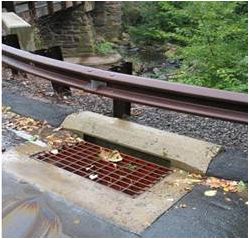One of the areas I recently investigated for an industrial client was the need for a  stormwater permit or a No Exposure Certificate so I thought this would be a good topic of which to give an overview. Stormwater is generated from melting snow, precipitation and run-off from irrigation. It is classified into two categories either non-point source or point source. Most stormwater from roads, parking areas and buildings is classified as point source which is defined as “any discernible, confined and discrete conveyance…”. As point sources, stormwater discharges are covered by the Clean Water Act’s (CWA) National Pollutant Discharge Elimination System (NPDES) permitting process. This process is applicable to the following three areas:
stormwater permit or a No Exposure Certificate so I thought this would be a good topic of which to give an overview. Stormwater is generated from melting snow, precipitation and run-off from irrigation. It is classified into two categories either non-point source or point source. Most stormwater from roads, parking areas and buildings is classified as point source which is defined as “any discernible, confined and discrete conveyance…”. As point sources, stormwater discharges are covered by the Clean Water Act’s (CWA) National Pollutant Discharge Elimination System (NPDES) permitting process. This process is applicable to the following three areas:
- Multiple Separate Stormwater Systems (MS4)—these are conveyance systems for stormwater that are:
a) owned by a public entity (i.e. a city, town or state) and discharge to waters of the US;
b) designed or used to collect or convey stormwater (including storm drains, pipes, ditches, etc.);
c) they are not part of a combined sewer;
d) they are not part of a Publicly Owned Treatment Works (sewage treatment plant). - Construction Activities—these are sites that a one acre or greater that typically require the EPA’s Construction General Permit (CGP) administered by the state in which the construction activity is located or by the EPA for states without authorized NPDES stormwater programs. The EPA’s CGP was updated in February of this year and details of the most recent changes can be found at EPA’s Construction General Permit (CGP).
- Industrial Activities—there are ten (10) industrial activities that are covered by the Multi-Sector General Permit (MSGP) if EPA is the regulating authority then industrial activities that fall within these categories will require an MSGP.
Construction and Industrial activities are governed by all but a few states—where they are not the regional office of the EPA is the governing authority. The delegation of the NPDES stormwater program makes it variable among the states so be certain to check your state to ensure compliance.
Do you have additional questions about the NPDES permitting process. If so, please find additional resources below or feel free to leave a comment below:
Stormwater Basics
http://cfpub.epa.gov/npdes/stormwater/swbasicinfo.cfm
EPA Website for Industrial Stormwater Discharges
http://cfpub.epa.gov/npdes/stormwater/indust.cfm?program_id=6
Industrial Stormwater Permit Guide
http://www.pneac.org/stormwater/

